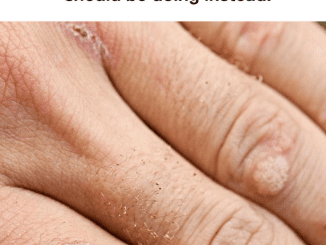Your body is smarter than you think. Long before serious problems show up on a lab report, your body sends out early warning signs—tiny whispers that something’s off. But most of us brush them aside. A tingling toe? Probably nothing. A strange craving? Just a random mood. Right?
Not always.
Here’s the truth: some of these subtle signs could be your body’s way of waving a red flag. And ignoring them might mean missing a chance to catch something early—before it becomes serious.
Let’s break down 10 important signals your body might be giving you and what they could mean.
Tingling or “Pins and Needles” in Feet or Hands

Ever feel like ants are crawling on your skin—especially your feet? That tingling sensation might seem harmless, but it could be a sign of nerve damage or poor circulation. In many cases, it’s linked to conditions like diabetes, vitamin B12 deficiency, or peripheral neuropathy.
When it becomes frequent, don’t ignore it. Your nerves might be screaming for attention.
Unexplained Fatigue That Lingers
We all feel tired now and then. But if you’re constantly running on empty, even after a full night’s sleep, something’s not right. Persistent fatigue can be a sign of:
- Anemia
- Thyroid dysfunction
- Chronic infection
- Even certain cancers
If coffee doesn’t help and rest doesn’t recharge you, it’s time to listen to your body.
Pale or Discolored Skin
Take a look at your skin tone, especially on your palms, lips, and under your eyelids. If things look unusually pale or even slightly bluish, it could indicate low blood oxygen levels, poor circulation, or iron deficiency.
When blood flow or red blood cells are low, your skin is often the first to reflect it.
Video : 5 Ways Your Body May be Telling You Something’s Wrong
Hair Thinning or Shedding
Hair loss isn’t just about aging or genetics. Sometimes, your hair is the first to respond to nutritional deficiencies, stress, or hormonal imbalances like low thyroid levels.
If you’re seeing clumps in the shower or more strands on your brush than usual, it’s time to dig deeper.
Itchy Skin Without a Rash
Itchy skin without a visible rash can be linked to liver issues, kidney problems, or even blood disorders. Your liver and kidneys help filter toxins from your blood, and when they’re not functioning properly, that irritation may surface through your skin.
Scratching won’t fix it—but finding the root cause can.
Sudden Cravings for Non-Food Items
Craving ice? Chalk? Dirt? This isn’t just weird behavior—it’s called pica, and it’s often a symptom of iron deficiency anemia. Your brain can misinterpret mineral deficiencies as cravings for bizarre textures.
If you’ve ever chewed on ice cubes compulsively, it might be time to get your iron checked.
Frequent Headaches or Blurred Vision

Recurring headaches paired with vision issues could signal anything from dehydration to high blood pressure, or even neurological conditions. If they come out of nowhere and don’t respond to over-the-counter meds, your body might be trying to flag something bigger.
Pay attention—especially if symptoms are getting worse or more frequent.
Changes in Fingernails
Your nails are tiny mirrors of your internal health. Watch for:
- Ridges
- Spoon-shaped nails
- Yellowing
- Clubbing (rounded nail tips)
These could indicate iron deficiency, lung issues, or even autoimmune diseases. Don’t ignore those subtle shifts—they’re more than cosmetic.
Persistent Digestive Issues
Bloating, cramping, gas, or irregular bowel movements that happen often may be your body’s way of reacting to:
- Food intolerances
- Inflammation
- Digestive disorders like IBS or celiac disease
If your gut’s not happy, chances are something you’re eating—or not digesting—is causing deeper issues.
Random Bruising
Got bruises popping up without any clear injury? That could be a sign of vitamin K deficiency, blood clotting issues, or even a platelet disorder. Your body is designed to handle bumps and nicks. When it stops clotting the way it should, bruising becomes a major clue.
Why You Shouldn’t Ignore These Clues
Your body is always talking. It nudges you with symptoms, discomfort, and small changes—not to scare you, but to guide you. These signs are like dashboard lights in your car: not always urgent, but never random.
Video : 4 SIGNS THAT YOU HAVE BEEN MENTALLY ABUSED! 🥺
By learning to read these clues early, you give yourself a massive advantage—early detection, faster treatment, and peace of mind.
When to Take Action
Here’s a simple rule: If something feels off and it’s persistent—don’t ignore it. Get a check-up. Ask questions. Run the tests. You’re not being paranoid—you’re being proactive.
Most serious conditions start with minor symptoms. The sooner you respond, the better your outcome.
Conclusion: Your Body Is Smarter Than Google—Trust It
You don’t need to panic every time something feels weird. But you do need to be aware. Your body is smarter than any app or search result—it knows when something’s wrong.
Listen to it. Respect the signals. And if you feel like something’s off? Follow that instinct. It might be the most important decision you make for your health.


